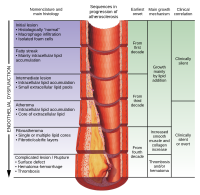
Photo from wikipedia
Correlation between the level of high-sensitivity C-reactive protein (hs-CRP) and the incidence of intracranial arterial stenosis (ICAS) is unclear. We aim to investigate the relationship between hs-CRP levels and ICAS.… Click to show full abstract
Correlation between the level of high-sensitivity C-reactive protein (hs-CRP) and the incidence of intracranial arterial stenosis (ICAS) is unclear. We aim to investigate the relationship between hs-CRP levels and ICAS. A total of 1458 patients aged ≥ 40 years were enrolled in this study. All the participants had a magnetic resonance angiography (MRA) examination for the evaluation of ICAS. Participants were classified into four groups according to stroke and ICAS. Multivariable logistic regression models were used to assess the relationship of hs-CRP levels and ICAS status. A total of 432 (29.63%) subjects had ICAS. The levels of hs-CRP in stroke group were significantly higher than those in non-stroke group ( p < 0.001). Patients with ICAS tend to have higher hs-CRP levels ( p < 0.001). In multivariate analysis, the fourth hs-CRP quartile had the strongest association with ICAS in both stroke group and non-stroke group (OR 2.512, 95% CI 1.651–3.853, p < 0.001 for stroke group, and OR 2.534, 95% CI 1.435–4.595, p = 0.002 for non-stroke group) among the four quartiles of hs-CRP levels. Our study suggests that elevated serum hs-CRP levels are associated with higher risk of ICAS, in both stroke patients and non-stroke participants.
Journal Title: Neurotoxicity Research
Year Published: 2019
Link to full text (if available)
Share on Social Media: Sign Up to like & get
recommendations!